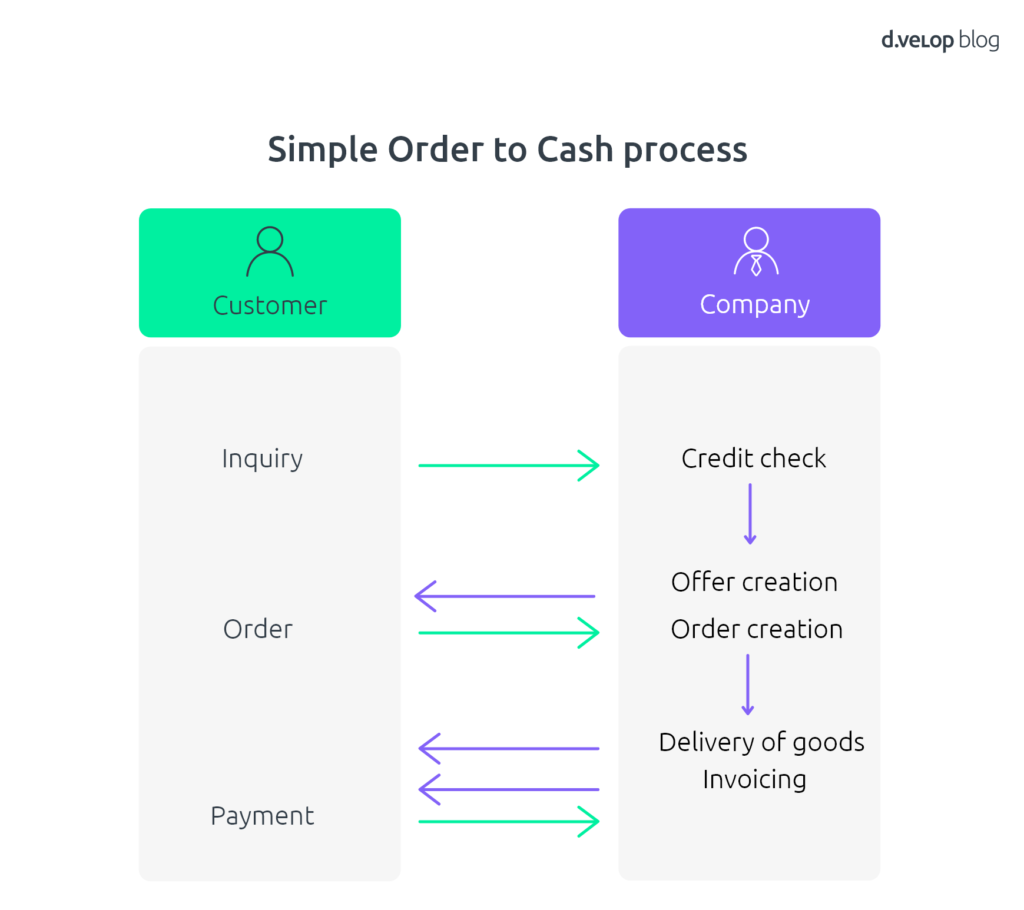In order to ensure profitability, companies must continue to ask, how can they increase sales and productivity, whilst keeping costs to a minimum? Looking at expenditure, in particular process costs, is an essential ongoing exercise that all business must adopt. By reviewing, testing and optimising internal processes, either via change of process, technical transformation or a combination of both, competitive advantage and substantial savings are achievable.
As an example, the Order to Cash process in Dynamics 365 plays an important role and at the same time, represents a lever for expanding cost leadership.
In this article we would like to draw attention to possible potentials for improving this process.
What does Order to Cash mean?
Order to Cash (also OTC or O2C) describes the entire sales process and includes various sub-processes such as preparing an offer, credit check or order processing. The process begins with the customer’s inquiry and ends with the delivery of the goods or the invoice. The counterpart on the supplier side is the procurement process (Purchase to Pay). The following diagram illustrates the end-to-end process in a simplified representation:
What are the challenges?
One of the emerging variables is the customer side. Inquiries are made to the company and the data is processed and recorded in Microsoft Dynamics 365 Business Central (Business Central). Further sub-processes, such as creditworthiness checks, creation of quotation and proposal are initiated.
The acceptance of subsequent orders can be coordinated by a corresponding modular ordering system in Business Central. Here, too, it is important to record information correctly and transfer it to the system. Existing framework contracts and other agreements must importantly be considered when processing the order. These in many cases are often located in business silos throughout the company, possibly in paper format or even in shadow systems. All these subsequent steps require manual intervention, adding considerably to delay of fulfilment and the overall cost/profitably of the transaction.
The above points are accompanied by a lack of transparency in the processes, creating poor communication both internally and externally, resulting in customer service frustration and complaints.
Incorrect orders or orders that have been entered twice in Business Central, pose challenges in errors correction, as does incorrect stock information and subsequently, leads to delays in the downstream processes and again further erodes profitability.
What potential can be exploited in the order to cash process with Dynamics 365?
Three key factors can be identified that increase productivity with Business Central, aligned with a standardised order-to-cash process as part of continuous improvement.
Internal approval processes can be digitised using a workflow engine. Processes are not only transferred 1:1, but directly adapted and optimised to the new technical possibilities. For example, a document management system (DMS) can help to map a variety of processes, providing context-related information across systems.
The latter aspect is important as a second factor, so that all authorised users along the entire process chain have the necessary data at their disposal at all times. This shortens throughput times, improves transparency and enhances the ability to provide information to customers.
The third factor is the capture and processing of documents. For example, incoming orders can be automatically captured using software for classifying documents and transferred to Business Central. Enormous savings are possible here. Both standardised order forms and external formats can be reliably recognised and processed, thanks to logical sets of rules and artificial intelligence.
Risks when implementing with Business Central
Business Central is an ERP system for medium-sized and large companies and is central to an organisations finance controls, human resources, production and logistics.
Of course, there are many other areas of business process undertaken outside of its domain. Therefore, it is critical to implement seamless functionality, when digitising auxiliary processes that require links to external systems or some steps run outside of Business Central.
By not adopting certified solutions, it can lead to increased maintenance and expensive reprogramming or support costs. It can also result in standardised update plans being prevented in Business Central or can only be carried out with considerable additional effort and expense.
It is recommended that you investigate appropriate partners who have tried and tested tailor-made solutions in their portfolio, offering confidence and an aligned upgrade path to supplement existing ERP processes. Due to growing complexity, it is no longer possible to map every eventuality and every requirement in one piece of software alone. The key is integration of the various solutions into a harmonious and functioning system landscape.
Interfaces in Business Central as a prerequisite for digitising the process
Standardised interfaces help to map and support the order to cash process in Dynamics 365. It is equally as important to ensure that existing standards are adhered too. Standard interfaces ensure that the integrity of the data is preserved and equally, that the basic needs for meeting legal requirements are met. For example, the required revision security presupposes that data cannot be lost during processing and that documents must be archived in an unchangeable manner.
Conclusion
Automating the order to cash process in Dynamics 365 can make a significant contribution to reducing process costs and improving cash flow. Thanks to the simplification for employees in day-to-day business via software-supported process efficiency, better working practices and increased employee satisfaction can be achieved. The higher information content ensures faster processes and the resulting efficiency and transparency, enhances greater customer satisfaction and advocacy.
A certified Partner with the appropriate solution integration in the required third-party systems, such as a DMS, can make a significant contribution to the success of the project. Their expertise in undertaking such projects reduces risk and ensures the correct preparation and planning is applied.
An open-minded approach to process investigation, with subsequent change of manual processes and/or automation, can considerably reduce transactional cost, provide better margins, whilst increasing customer satisfaction and advocacy.
Book a Software Demo
Or book a software demo directly and have the process demonstrated live to you.

